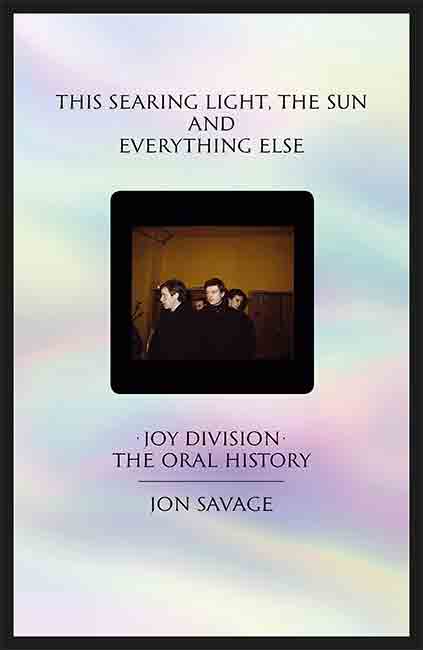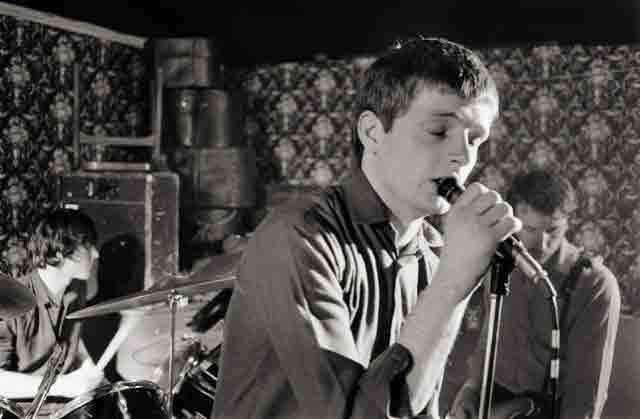
The Searching Light, The Sun and Everything Else. Joy Division: The Oral History, Jon Savage (Faber, 2019)
As someone who heard the first Joy Division LP , Unknown Pleasures, immediately after it was released in 1979 (thanks Andy!), and was an avid reader of both Sounds and NME, I was privy to all the nonsense that ensued when Ian Curtis killed himself the following year. The canonisation of Ian Curtis was immediate, pretentious and unnecessary, and avoided anybody dealing with the mental and physical health issues that the band’s singer must have engaged with. The whole messianic cult, of course, helped sales of both Closer, the band’s second LP, and the elegaic single ‘Atmosphere’, whose video seemed to serve as a reflective obituary for Curtis.
Joy Division would, of course, reincarnate as the appalling and over-rated New Order; Curtis remains the centre of teenage and/or post-punk music fans obsession to this day. Thankfully, Jon Savage’s book does nothing to add to the myth, but simply tells the story of Joy Division’s formation, short life and ending through the words of others. It offers a clear-headed and forthright version of events, an opinionated version of punk and its fallout (especially in relation to Manchester and its environs), and an insiders’ take on the music.
There’s no doubt that Joy Division were, and remain, something special musically, which is why plenty of people – including me – still listen to them, but they weren’t alone in the post-punk universe, which was full of bands making gloomy, angst-ridden and rhythmically intriguing music. In the late 1970s many UK cities, including London, were in a bad way (much as New York was in the States) and as many people – including rock and art critics, sociologists and others – have written about, poverty and an abundance of empty buildings, allowed a flowering of the arts to happen. In addition, this flowering was fuelled by the ground zero of punk, which encouraged experiment and play over technique and virtuosity.
Manchester was one such city: post-industrial and devastated by it, but full of angry and abandoned youth. Somehow, the Sex Pistols caused the Buzzcocks and Tony Wilson at Granada TV to take note of punk; somehow a couple of gigs by these bands was a catalyst to the formation of many other bands, including Warsaw, who would go on to become Joy Division.
There was, it seems, no grand plan, although Wilson’s decision to start Factory Records and ‘sign’ Joy Division (there were no contracts) clearly had a major effect on what started as a bunch of mates messing around with limited equipment and ideas. Joy Division learnt the hard way about touring, being ripped-off by promoters, having their sound changed by producers and engineers, and about being used by critics and writers for their own ends. (Though they couldn’t of course have foreseen what would happen after Curtis died, and seemed in no way complicit.)
Joy Division played the old-fashioned music industry game of touring the country, and later Europe, in vans and in poverty. Blagging support slots, making friends who would support them and let them sleep on their floors, making contact with like-minded bands such as Cabaret Voltaire, who they could share stages and music with. Two of Joy Division’s members remain unhappy to this day with the sound of their first album, but all agree that the production is what made it so different and intriguing. (Official and unofficial live releases would support this).
At the centre of this book and story there’s a band trying to hold it together, three ordinary blokes who don’t know how to deal with their singer’s health issues or his long-term affair while he’s away from his wife. A band dealing with epilepsy mid-gig, their only contingency plan it seems being to take Curtis off stage for a roadie to look after and then play a song they know someone else can sing. As for the affair they allows themselves to be complicit in, or at least leave unacknowledged, the emotional and sexual tangles and deceits which are adding to the singer’s depression and angst.
There’s no big reveals in Savage’s book, no new claims, no sleights of hand or retrospective solutions. This book cuts through the crap, and shows just how young, confused and perhaps how ordinary this band were, caught up as they were in dealing with being at first a cult band and then – in the months after Curtis’ untimely death – only the backing band, providers of funeral music ,for Saint Ian. The book makes clear, however that ‘the Ian Ian became was always there’, and shows the surprise, shock and disbelief that Curtis’ suicide produced amongst all those who knew him. Bernard Sumner, near the end of the book, succinctly states that ‘we [i.e. the band] were making it up as we were going along’, which is exactly what this book is about. It makes the story more human and believable than ever before, and rightly puts a focus on the music rather than ideas or theories of personality or stardom.

Rupert Loydell
‘Atmosphere’ on Youtube:
